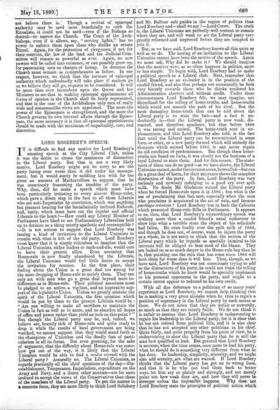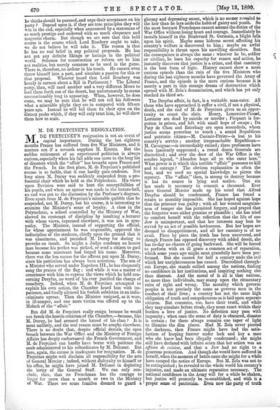LORD ROSEBERY'S SPEECH.
IT is difficult to find any motive for Lord Rosebery's amazing speech at the City Liberal Club, unless it was the desire to create the maximum of distraction in - the Liberal party. But that is not a very likely motive. Lord Rosebery might not be sorry to see the party faring even worse than it did under his manage- ment, but it would surely be saddling him with far too great an amount of Machiavellism to suggest that he was consciously fomenting the troubles of the party. Why, then, did he make a speech which must have been particularly irritating to • every sincere Home-ruler, which gave a direct slap in the face to all those Liberals who are anti-Imperialist by conviction, which was anything but pleasant hearing for the Socialistically inclined Radicals, and, lastly, which must have cut the regular and official Liberals to the heart ?—How could any Liberal Member of Parliament have liked to see Parliamentary Liberalism held up to derision as a thing utterly apathetic and contemptible ? —It is not serious to suggest that Lord Rosebery was issuing a kind of invitation to the Liberal Unionists to reunite with what is left of the old party. Lord Rosebery must know that it is simply ridiculous to imagine that the Liberal Unionists, either leaders or rank-and-file, would care to leave their present allies. Even assuming that Homerule is now finally abandoned by the Liberals, the Liberal Unionists would feel little desire to accept the invitation for reunion. In the first place, their feeling about the Union is a great deal too strong for the mere dropping of Home-rule to satisfy them. They can only act with men who go a great deal beyond mere in- difference as to Home-rale. Their political associates must be pledged to au active, a vigilant, and an imperative sup- port of the legislative Union. Unless we greatly mistake the spirit of the Liberal Unionists, the first question which would be put by them to the present Liberals would be : " Are you willing to make all sacrifices to maintain the Union in. fact as well as in name, aud to abandon all hopes of office and power rather than yield an inch on this point ? ' But though the Liberal party may be, and, indeed, we believe are, heartily sick of Home-rule and quite ready to drop it while the • results of -local government are being watched, we cannot suppose that they would stand forth as the champions of Unionism and the deadly foes of parti- cularism m all its forms. But even granting, for the sake of argument, that the difficulty about Home-rule was some- how got out of the way,' is it likely that the Liberal Unionists would be able to find a modus vivendi with the Liberal- party ? Assuredly no. The Liberal Unionists, as regards practically all the chief questions of the day—ISis- establishment, Temperance, Imperialism, expenditure on the Army and Navy, and a dozen other matters—are far more inclined to accept the-views of the COnservatives than those of the members of the Liberal party. To pat the matter in a concrete form, they are more liliikkely to think Lord Salisbury and Mr. Balfour safe guides in the region of politics, than Lord Rosebery and—shall we say ?-Lord Crewe. The truth is, the Liberal Unionists are perfectly well content to remain where they are, and will want to see the Liberal party very greatly reformed and improved before they are tempted to join it. ' But, as we have said, Lord Rosebery knows all this quite as well as.we do. The issuing. of an invitation to the Liberal Unionists cannot have been the motive of the speech. Again we must ask, Why did he make it ? We should imagine that the motives were, as so often happens in :Utica, more or less simple. To begin with, Lord Rosebery . I to make a political speech to a Liberal club. Next, remember that Lord Rosebery as an ex-leader is in the position of the candid friend, and also that perhaps not unnaturally he feels very bitterly towards those who he thinks rendered his Administration abortive and without credit. Under these circumstances Lord Rosebery felt, we may imagine, not disinclined for the telling of home-truths, and home-truths which would not smooth the path of his rival. But the most (ring home-truth that can be told about the Liberal party is to state the fact—and a fact it un- doubtedly is----that the Liberal party is now weak, dis- tracted, and therefore apathetic, but that before 1886 it was strong and united. The home-troth next in un- pleasantness, and this Lord Rosebery also told, is the fact that until the Liberal party can be reconstituted in some form or other, or a new party formed which will embody the elements which existed before 1886, it can never regain its old condition of predominance. But thOugh these home- truths are based on facts, it was clearly not the business of a loyal Liberal to state them. And for this reason. The state- ment of them can do no good—as we have shown, the Liberal Unionists cannot, under the circumstances, be recalled—but can do a great deal of harm, for their utterance shows the complete distraction of the party. In fact, Lord Rosebery was very uselessly and unwisely indulging in a good cry over spilt milk. No doubt Mr. Gladstone ruined the Liberal party when he forced Home-rule upon it in 1886 ; but what is the use of proclaiming that fact now, especially when the man who proclaims it acquiesced in the act of ruin, and became particeps criminis ? Lord Rosebery was in both the Cabinets which presented Home-rale Bills to Parliament. It appears to us, then, that Lord Rosebery's extraordinary speech was nothing more than a candid friend's usual endeavour to show into what a terrible state the object of his solicitude had fallen. He cries loudly over the spilt milk of 1886, and though he does not, of course, want to injure the party as a whole, he is not sorry to think that the section of the Liberal party which he regards as specially inimical to his interests will be obliged to bear most of the blame. They are looked on as so much deeper in the Home-rule bog than he is, that pointing out the rain that has come since 1886 will hurt them far worse than it will him. Thus, though, as we . have said, Lord Rosebery was not consciously trying to add to the distractions of his party, he could not resist the telling of home-truths which he knew would be specially unpleasant to his personal opponents in the party, and might to a certain extent appear to redound to his own credit.
With all due deference to a politician of so many years' experience as Lord Rosebery, we cannot help thinking that he is making a very great mistake when he tries to regain position of supremacy in the Liberal party by such means as these. We do not mean that they are unfair or unworthy, so much as that they are utterly futile. We do not think it is unfair to assume that Lord Rosebery is endeavouring to regain his leadership in the Liberal party, for it is clear that he has not retired from political . life, and it is also clear that he has not accepted any other politician as his chief. Quite fairly, and quite properly from his point of view, he is endeavouring to show the Liberal party that he is still the man best qualified to lead. But granted that Lord Rosebery is anxious, when the time comes, once more to lead his party, what he should do is something very different from what he has done. In leadership,.simplicity, sincerity, and we might slab add serenity, are what are wanted. If: Lord Rosebery thinks that the' Liberal party has got on to wrong lines, and that it is' he who can lead them back to better ways, let him say so plainly and strongly, and not merely point'but how weak they are, and how they will never be stronger unless' the impossible happens. Why does "not Lord Rosebery state the principles of political action which he thinks should be pursued, and urge their acceptance on his party ? Depend upon it, if they are tree principles they will win in the end, especially when announced by a statesman of so much prestige and endowed with so much eloquence and magnetic charm. But though we are sure that this bold course is the course which Lord Rosebery ought to take, we do not believe he will take it. The reason is that he has no real belief in any political proposals. He has not got any definite likings or hating in the political world. Schemes for construction or reform are to him not realities, but merely counters to be used in the game. There is, therefore, no ardour in his touch. He cannot even throw himself into a part, and simulate a passion for this or that proposal. Whoever heard that Lord Rosebery was keenly in earnest about a Bill in Parliament ? The Liberal party, then, will need another and a very different Moses to lead them forth out of the desert, but unfortunately he seems unconscionably long in appearing. When, however, he does come, we may be sure that he will not tell his followers what a miserable plight they are in compared with fifteen years ago. Instead he will bid them fix their eyes on the distant peaks which, if they will only trust him, he will show them how to scale.







































 Previous page
Previous page